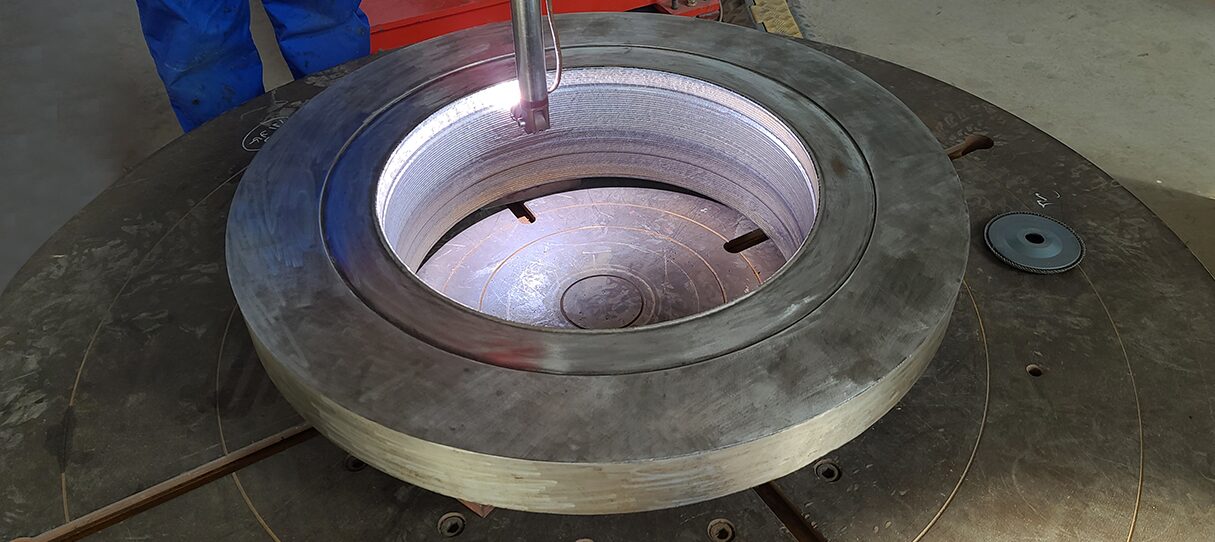Share this
In industrial manufacturing, flanges play a crucial role in connecting piping systems, widely used in industries such as oil, natural gas, chemical engineering, and power generation. Clad flanges, as a high-performance and wear-resistant flange type, have gradually become the preferred choice due to their unique structure and superior corrosion and wear resistance properties.
What is a Clad Flange?
A clad flange is a type of flange where the surface is covered with a layer of wear-resistant and corrosion-resistant metal material through a cladding process. This technology enhances the flange’s durability and performance, enabling it to withstand harsh working conditions.
The manufacturing process of a clad flange involves applying high-performance materials such as stainless steel, alloy steel, and nickel-based alloys onto a carbon steel or low-alloy steel base. This ensures that the flange not only possesses good strength and toughness but also has excellent resistance to corrosion and wear. This design allows the clad flange to endure higher pressure and complex operating environments, making it suitable for applications that demand high material resilience.
Advantages of Clad Flanges
Strong Corrosion Resistance
By cladding the flange with high corrosion-resistant materials like stainless steel or nickel alloys, clad flanges effectively resist the corrosion of chemicals, acids, and alkalis, making them ideal for use in industries such as chemical processing and petrochemicals.Excellent Wear Resistance
Over time, piping systems often suffer from wear, especially in environments with high flow rates and solid particles. The wear-resistant surface layer of the clad flange ensures that it remains durable in high-wear conditions, reducing the need for frequent maintenance and replacement.High Strength and Toughness
Clad flanges offer not only surface protection but also internal toughness and strength from the base material, enabling them to withstand higher operational pressures and temperatures.Cost-Effective
Clad flanges are cost-effective because they use carbon steel or low-alloy steel as the base material and only apply a layer of high-performance alloy material to the surface. This approach lowers the overall production cost while meeting high-performance requirements.Customizable Design
Clad flanges can be customized to suit specific operational needs by choosing different cladding materials, offering tailored solutions for various specialized applications.
Applications of Clad Flanges
Due to their superior performance, clad flanges are widely used in the following industries:
Oil and Gas Industry
In the extraction and transportation of oil and natural gas, piping and flanges must withstand high temperatures, high pressure, and corrosive media. Clad flanges’ corrosion and high-pressure resistance make them the ideal choice for this industry.Chemical and Pharmaceutical Industries
In chemical production, which often involves acidic, alkaline, and other corrosive fluids, clad flanges’ corrosion resistance ensures the safety and long-term reliability of the system.Marine Engineering
For offshore platforms and other marine environments, clad flanges resist seawater corrosion and high-pressure conditions, ensuring the stability and safety of piping systems.Power Industry
In power plants, where high temperature and pressure are common, clad flanges offer the necessary strength and durability to maintain system integrity in harsh working environments.
Manufacturing and Quality Control of Clad Flanges
The manufacturing process of clad flanges is more complex and requires precise techniques and rigorous quality control. First, suitable base materials and cladding materials must be selected, followed by applying the cladding material evenly onto the flange surface through cladding technology. To ensure the flange’s durability and high performance, the entire process must carefully control parameters such as temperature, welding speed, and material selection.
Moreover, once the clad flanges are finished, they undergo a series of inspections and tests, including hardness tests, corrosion resistance tests, and leak-proof tests, to ensure they perform optimally in real-world applications.
Conclusion
Clad flanges, with their unique advantages of corrosion resistance, wear resistance, and high-temperature endurance, have become the top choice for many high-demand industrial applications. Whether in the petrochemical, natural gas, power generation, or marine engineering industries, clad flanges offer excellent performance and long-lasting durability. Choosing clad flanges is choosing a more efficient and safer engineering solution.

